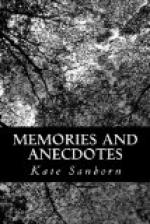GNOSIS
Thought is deeper than all
speech,
Feeling deeper than all thought;
Souls to souls can never teach
What unto themselves was taught.
We are spirits clad in veils;
Man by man was never seen;
All our deep communing fails
To remove the shadowy screen.
Heart to heart was never
known;
Mind with mind did never meet;
We are columns left alone
Of a temple once complete.
Like the stars that gem the
sky,
Far apart, though seeming near,
In our light we scattered lie;
All is thus but starlight here.
What is social company,
But the babbling summer stream?
What our wise philosophy
But the glancing of a dream?
Only when the sun of love
Melts the scattered stars of thought,
Only when we live above
What the dim-eyed world hath taught,
Only when our souls are fed
By the fount which gave them birth,
And by inspiration led
Which they never drew from earth.
We, like parted drops of
rain,
Swelling till they meet and run,
Shall be all absorbed again,
Melting, flowing into one.
CHRISTOPHER PEARSE CRANCH (1813-1892).
Cranch’s own title for this poem was “Enosis,” not “Gnosis” as now given; “Enosis” being a Greek word meaning “all in one,” which is illustrated by the last verse.
It was first published in the Dial in 1844. “Stanzas” appeared at the head, and at the end was his initial, “C.”
CHAPTER IV
Three Years at Smith College—Appreciation of Its Founder—A Successful Lecture Tour—My Trip to Alaska.
“There is nothing so certain as the unexpected,” and “if you fit yourself for the wall, you will be put in.”
I was in danger of being spoiled by kindness in New York and the surrounding towns, if not in danger of a breakdown from constant activity, literary and social, with club interests and weekend visits at homes of delightful friends on the Hudson, when I was surprised and honoured by a call from President L. Clark Seelye of Smith College, Northampton, Massachusetts, who invited me to take the position of teacher of English Literature at that college.
I accepted, and remained at Northampton for three years, from 1880-1883. It was a busy life. I went on Saturday afternoons to a class of married ladies at Mrs. Terhune’s (Marion Harland) in Springfield, Massachusetts, where her husband was a clergyman in one of the largest churches in that city. I also published several books, and at least two Calendars, while trying to make the students at Smith College enthusiastic workers in my department.
Mrs. Terhune was a versatile and entertaining woman, a most practical housekeeper; and she could tell the very best ghost story I ever heard, for it is of a ghost who for many years was the especial property of her father’s family.




